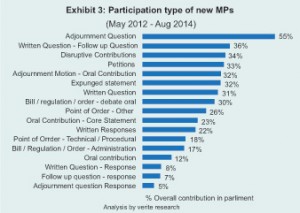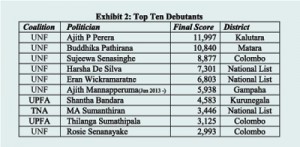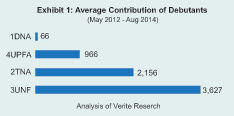News
Debutants in Parliament: Doing better in the Opposition
View(s): As many as 87 (39%) of the 225 MPs in the current Sri Lanka Parliament are debutants – that is, they are first time Members of Parliament. The question is, who are they batting for, and how are they doing?
As many as 87 (39%) of the 225 MPs in the current Sri Lanka Parliament are debutants – that is, they are first time Members of Parliament. The question is, who are they batting for, and how are they doing?
Most new MPs batting for the UPFA: Almost three fourths, 62, of the debutants are sitting with the UPFA. 20 MPs are with the UNF, 4 with the TNA and 1 with the DNA. But UNF team outscoring the rest: Normally well represented groups can negotiate outcomes to their advantage. But, according to Manthri.lk, a pioneering online platform that monitors and ranks all the proceedings and actors in Parliament, debutants are not succeeding in making a mark in Parliament despite their numbers. Manthri.lk’s data for 28 months, May 2012-August 2014, shows that an average UNF debutant contributed four times more in Parliament than a UPFA debutant (Exhibit 1). Even the TNA debutants clock an average contribution twice as much as the UPFA debutants. The solitary DNF debutant has hardly contributed.
Doing better in the Opposition: The five most active debutants are from the UNF. Ajith Perera tops the list, with almost 12,000 productive minutes in Parliament, followed closely by Buddhika Pathirana, Sujeewa Senasinghe, Harsha De Silva and Eran Wickramaratne (Exhibit 2).
The opposite is also true, where 9 of the 10 least active MPs in Parliament are from the UPFA.
 Opportunities for Debutants: 14 of the 88 new MPs have performed better than the average continuing MPs. New MPs, therefore, certainly can succeed in Parliament, even though it is possible that they are afforded less priority by their party whips, compared with the seniors.
Opportunities for Debutants: 14 of the 88 new MPs have performed better than the average continuing MPs. New MPs, therefore, certainly can succeed in Parliament, even though it is possible that they are afforded less priority by their party whips, compared with the seniors.
How do debutants contribute? New MPs who succeed, do so by making their own opportunities – They have relatively higher rates of contribution in Adjournment motions, written questions, points of order and petitions, which are not usually constrained by the party whips. But even areas that depend on the party whip, such as Bill debates, show relatively high levels of contribution from the new MPs.
What explains the higher contributions from the new UNF MPs? Are the new UNF MPs of a higher calibre than the rest? Or do new MPs in Government have fewer opportunities than their Opposition counterparts? Please share your thoughts with Manthri.lk at feedback@manthri.lk or through texting 071-4639882.


